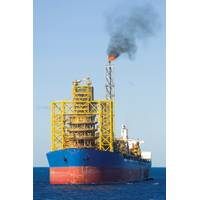GSF Condemns Maersk's Sulphur Surcharge
The Global Shippers Forum has reacted with suspicion to the announcement by the Maersk container shipping line of new fuel surcharge arrangements from 1 January 2019 to recover presumed costs from the introduction of low-sulphur marine fuel from 1 January 2020.Based on the information released by Maersk, the new charges, which are additional to agreed contract rates…
British International Freight Association Fumes Over Sulphur Surcharge
The British International Freight Association (BIFA), the trade association for UK freight forwarding and logistics companies, has described the container shipping industry’s recent imposition of a ‘sulphur surcharge’ as unjustified and blatant profiteering.It follows an announcement by Danish giant AP Moller Maersk that it is introducing a new bunker adjustment factor (BAF) surcharge on 1 January 2019…
DNV GL Completes Due Diligence of Dutch Windpark Spui
DNV GL, the world’s largest resource of independent energy experts and certification body, has successfully completed comprehensive due diligence of the Dutch Windpark Spui, for a group of lenders who are providing the debt financing for the project. The power generated at Windpark Spui, which will supply renewable electricity to more than 24,000 households, will be sold to Eneco Group…
EUROPE POWER: Spot slides on increased wind
European spot electricity prices for day-ahead delivery fell on Monday, pressured by increased wind power supply, while the June and July contracts gained on a warm and dry weather forecast. * The German baseload spot power price for Tuesday delivery stood at 33.70 euros ($37.85) per megawatt-hour (MWh), down 1.80 euros from the price paid on Friday for Monday delivery.
EU Seeks to Negotiate over Nord Stream Pipeline
Pipeline to pass through Danish, Swedish waters; project will bypass major gas transit route Ukraine. The European Union is seeking a mandate from its members to negotiate with Russia over plans for a gas pipeline under the Baltic Sea to Germany, an EU document showed, as some EU states fret the project will make Europe too reliant on Russian energy. The Nord Stream 2 pipeline would pass through Danish and Swedish waters and bypass Ukraine…
Shell Sells 185 UK Service Stations

Shell UK has accepted offers for the sale of 185 company-owned service stations to selected independent dealers and has exchanged contracts for 158 of these service stations. Through this transaction, Shell welcomes Motor Fuel Group (MFG) as a Shell dealer and strengthens its relationship with Euro Garages. It is anticipated that contracts for the remaining service stations will be exchanged in the coming weeks.
French Spot Premium Widens on Rising Demand
European prompt power prices diverged on Tuesday as French levels rose on forecasts for rising electricity demand while Germany's fell on higher renewable production. Germany's contract for Wednesday delivery was down 10 cents at 44.65 euros ($52) per megawatt-hour (MWh). The equivalent French contract rose 1.25 euros to 50 euros/MWh. Power demand in France will rise by 680 MW on Wednesday…
Colder Weather Outlook Boosts Prompt
Lower wind power production and forecasts for cooler weather lifted European prompt power prices on Thursday as they boosted demand. But demand was weakened ahead of the weekend and thermal plant capacity was going up, German traders said. They added that France was more bullish because cool weather correlates more closely with electricity usage there. Germany's contract for Friday delivery was up 9.5 euros at 34.75 euros ($41) a megawatt hour…
Spot Prices Up on Wind Power Drop
A drop in wind power levels after a stormy weekend helped boost European prompt power prices on Monday, but windy weather is set to continue, keeping a lid on the price gains, traders said. "Thermal plant supply is also quite comfortable. Solar power output is weak and demand is flat at high levels," one said. Germany's spot contract for Tuesday delivery was 7.95 euros up from the price paid for Monday at 27.30 euros ($32) a megawatt hour…
Curve Rebounds on Firmer Gas, Coal, Ends Week Lower
European forward power prices edged up on Friday, helped by rising coal and gas prices, although not enough to recoup losses made this week when the curve hit 11-year lows. Germany's Cal' 16 baseload position, the benchmark for European electricity prices for delivery next year, was last at 31.85 euros ($38) a megawatt hour (MWh), up 15 cents. The French contract also rose 15 cents to 38.30 euros per MWh.
Forwards Rebound Along with Oil, Wind Storms Ahead
European power forward prices rebounded in Wednesday afternoon trading as oil turned positive after breaching $50 a barrel on the downside for the first time since May 2009. Germany's Cal' 16 baseload position, the benchmark for European electricity prices for delivery next year, was last at 31.55 euros ($37) a megawatt hour, 15 cents above the close on Tuesday and 35 cents up from an intraday low of 31.20 euros.
Forward Prices Driven Up By CO2, Coal, Forecasts
Europe's forward power curve on Monday afternoon rose due to gains in coal and carbon prices and to forecasts that cold temperatures will set in from next month, traders said. Germany's Cal 15 baseload power rose 40 cents or 1 percent to 34.70 euros a megawatt hour, the highest in five weeks. The equivalent French contract, Cal '15 baseload, was up 15 cents at 42.65 euros/MWh.
Curve Retreats from Spike on Russia Sanctions
European power forwards on Tuesday fell sharply from opening highs hit on concern about a possible Russian backlash to economic sanctions from the European Union. German baseload power for the year ahead, calendar year 2015, was last at 35.35 euros ($47.4) a megawatt hour, down 70 cents from its opening high of 36.05 euros that had represented the highest price since March 10.
Russia Sanctions Concerns Lift Curve Prices
The possibility of a Russian backlash to any further economic sanctions from the European Union lifted power forward prices on Monday, with the German benchmark position reaching a new 4-1/2 month high. The EU reached an outline agreement on sanctions last Friday in the wake of the downing of a Malaysian airliner over eastern Ukraine which is held by Russian-backed separatists. Details of possible steps are expected in the next few days.
More Supply, Less Demand Cut Spot Prices
Lower demand and higher solar supply in the European prompt power market curbed spot prices on Tuesday, offsetting the impact of lower wind levels and thermal power plant outages, traders said. The German baseload power contract for delivery on Wednesday shed 2 euros on the day to 32 euros ($43.1) per MWh. The equivalent French contract was 25 cents euros lower, at 29.25 euros/MWh.
Europe Power Curve Holds on to Previous Session Gains
European power curve prices on Friday held on to the gains made in the previous session on heightened geopolitical risks, but traders said the market remained capped by weak fundamentals. Oil prices surged 2 percent on Thursday on news of a Malaysian jetliner being shot down over eastern Ukraine. European carbon and gas prices, which interact with power prices…
Spot Prices Fall as Supply Recovers, Demand Stalls
Forecasts for relatively comfortable levels of renewable power production in the coming week curbed European prompt power prices on Friday as the market also took account of weak demand. "We will be closing a supply gap, also in thermal capacity, while consumption will be limited medium-term in a week shortened by a holiday," one trader said. The German baseload power contract for Monday delivery was at 36 euros ($49.2) per megawatt-hour…
Drop in Wind, Solar Output to Lift Spot Prices
Falling German wind and solar power supply forecasts on Friday boosted European spot prices for early next week, with consumption at that time seen flat compared with this week's. "Wind power on Monday will fall to 3 gigawatts (GW) from levels around 5 GW at the beginning of this week and 7 GW seven days ago, and solar will go down by 3 GW by then from now," one trader said.
Offshore Floating Production Hits Headwinds

Floating production has been one of the most significant developments in the oil and gas industry over the past four decades. Since the first floating production unit (Argyll) was installed in 1975, more than 350 offshore fields too deep, too remote or too small for fixed platforms have been developed using floating production facilities. Looking forward, the future of the sector continues to look very promising…
